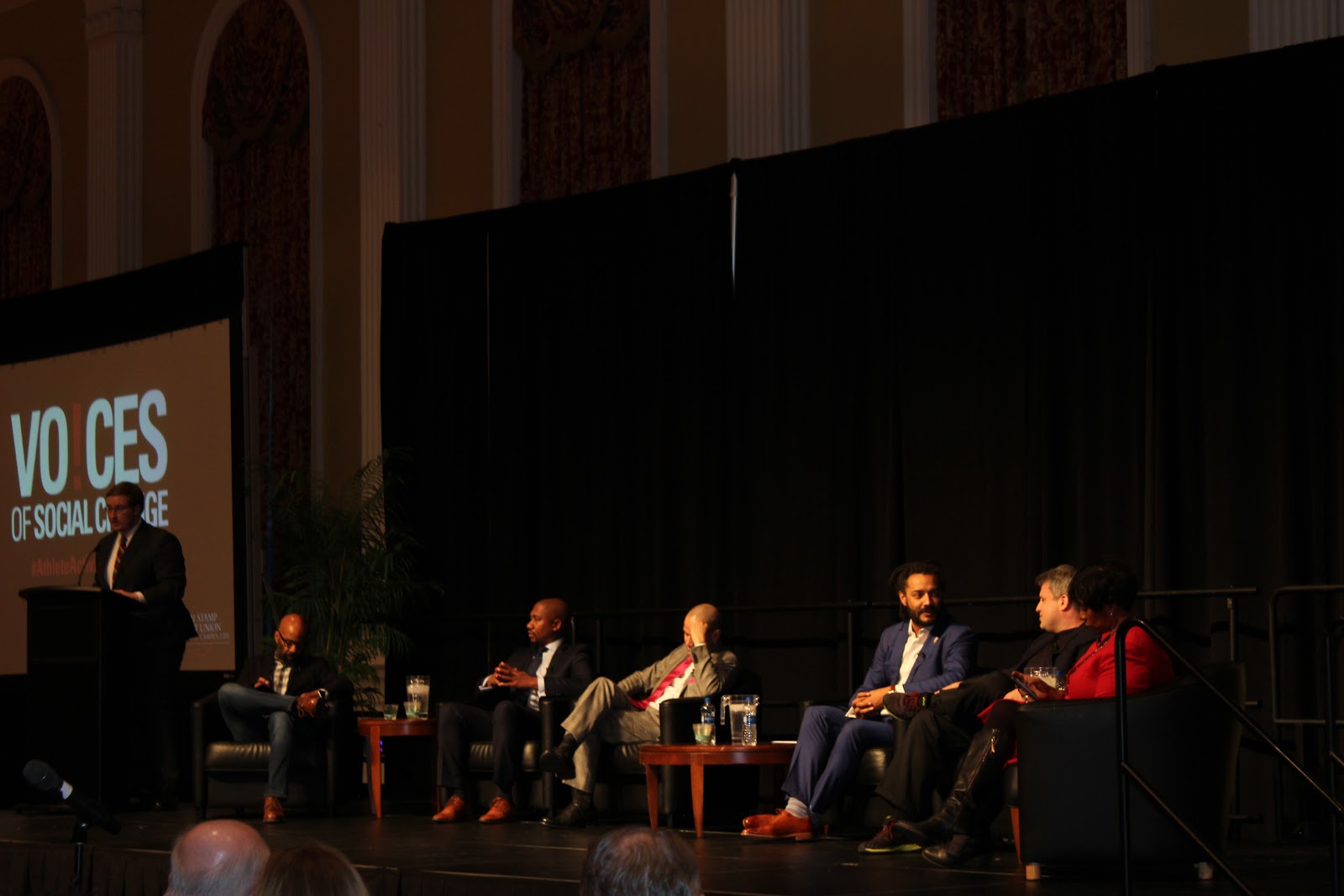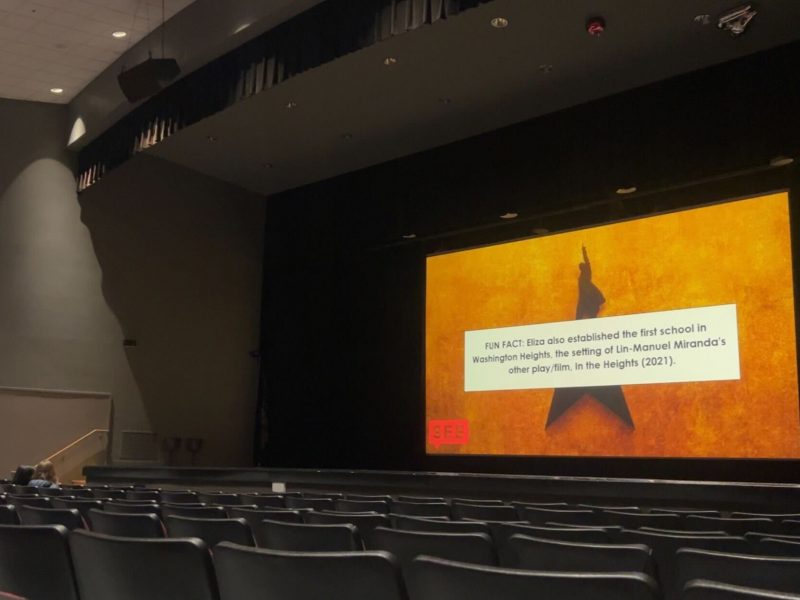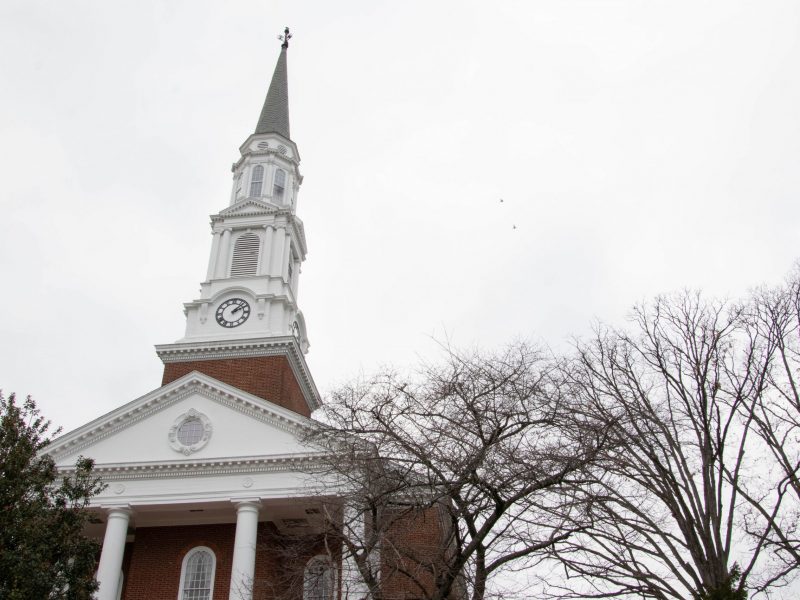From Muhammad Ali to Colin Kaepernick, athletes across sports have long been involved in activism, speaking out on social issues and fighting for the causes they feel passionately about.
Ali and Kaepernick were among many names mentioned at Thursday night’s “Athlete Activism and Social (In)Justice: Sport and Racial Politics” panel.
“Sports have always been tied to larger social, political and cultural issues,” said panelist Damion Thomas, the sports curator at the National Museum of African American History and Culture.
Kevin Blackistone, a frequent panelist on ESPN’s Around the Horn and a visiting professor at this university’s journalism college, moderated the event, hosted by the Leadership and Community Service-Learning office. His first question: “Why have we seen this re-emergence, do you think, right now, of activism on the part of athletes?”
Recently, Fox News anchor Laura Ingraham told LeBron James to “shut up and dribble,” in an effort to discourage the Cavaliers frontman from talking about political issues. Panelist Diane Roberts, a sports anchor for WUSA 9, said what Ingraham said is not “ignorance, it’s inflammatory.”
Dave Zirin, the first sports correspondent for The Nation in the publication’s history, called back to 2012, when neighborhood watch coordinator George Zimmerman fatally shot Trayvon Martin, an unarmed black 17-year-old, in Sanford, Florida. A sharp reaction followed from many athletes, including the Miami Heat. Several members of the team took a photo together wearing sweatshirts with their hoods up in solidarity with Martin, who was wearing a hoodie when he was killed.
Blackistone’s question has many answers. Zirin and Roberts agree that social media has had a particularly large influence on how athletes engage with sociopolitical issues.
“What did they do after they posed with their hoods?” Zirin asked. “They didn’t call the lead columnist at The Miami Herald. They put it on social media. … Athletes are able to go around the filter.”
Zirin also pinpointed Black Lives Matter as a shifting point for athlete activism. He extensively covered the 2015 protests at the University of Missouri, where several football players said they would not practice or play until university President Tim Wolfe stepped down. Wolfe, who faced criticism for what many students said was his mishandling of several racist incidents on the campus, resigned two days later.
Ben Carrington, a sociology and journalism professor at the University of Southern California who has studied the cross-section of race and sports for years, said there is a “fear of the pride and solidarity that might be generated amongst those ‘other’ blacks” — the fear that, if those with power can speak about issues, then that message will trickle down to smaller sections of marginalized communities, such as workplaces and schools.
On the ground in Missouri, Zirin observed much of what the rest of us didn’t, and a reversal of Carrington’s theory: The football players were not moved to action until the black women on campus moved them. Their protest also came after one student, who was not on the team, went on a hunger strike.
“What was really interesting to me was that I could not find a black athlete [at Missouri] who said that they had faced racism on campus,” Zirin said. “And I also could not find a black student [not on an athletic team] at Missouri who said they had not faced racism on campus.”
Acts like these, where the interest of the group is placed over the interest of the individual, are necessary, said panelist Grant Farred, an Africana studies and English professor at Cornell University.
“Why aren’t athletes making other kinds of demands at every level of the sport?” he asked. He then answered his own question: Athletes are in their own bubble of money and opportunity. At the college level, they don’t want to jeopardize their chance to make it to the pros; at the pro level, they want to ensure they aren’t cut.
“There are no innocents in the system,” he added.
With President Trump calling athletes protesting the flag “sons of bitches,” Blackistone asked if his actions have been a catalyst for protesting athletes.
“Donald Trump is a distraction more so than a catalyst, and engaging him might be a little counterproductive,” Thomas said, noting that the biggest weekend of protesting in the NFL came after Trump’s comments, when many of the players had not participated in previous protests against police brutality and racial discrimination.
Carrington said his studies have become much clearer to others since Trump’s election, whereas before he would often be met with confusion when trying to explain the intersection of sports and race.
“I don’t see many cases where it’s the athletes that are initiating, leading social change and social revolution,” Thomas said. “But what I often see is athletes responding to these larger movements and responding to a social issue that has galvanized a large community.”
Ultimately, much of the panel concluded that we cannot expect athletes alone to carry change.
“Why ask of athletes,” Zirin remarked, “what we don’t ask of ourselves?”



